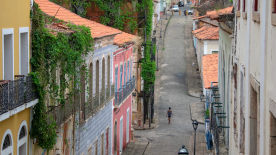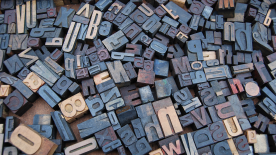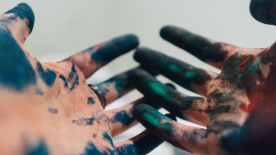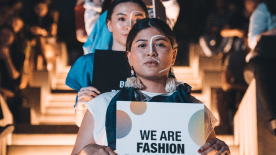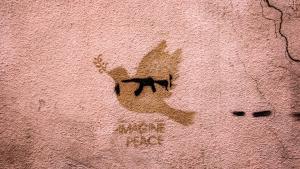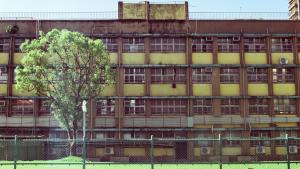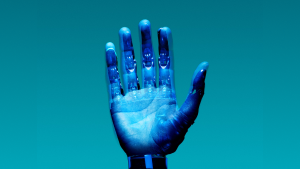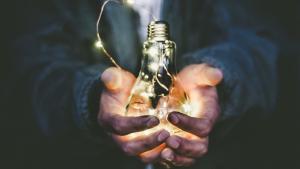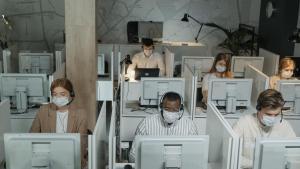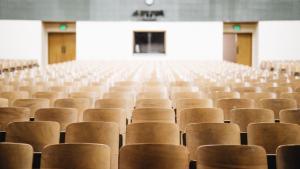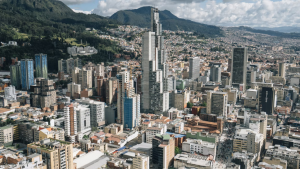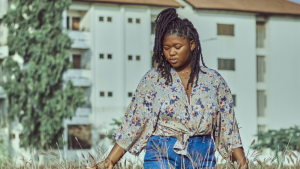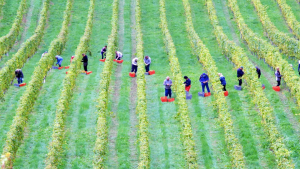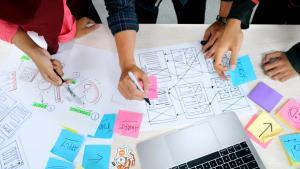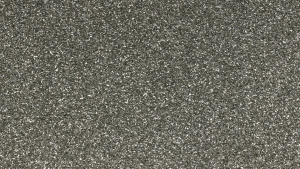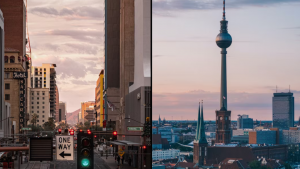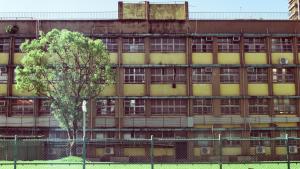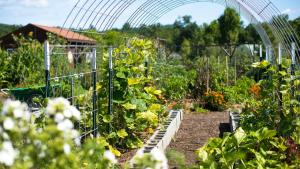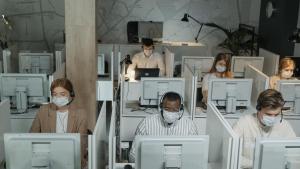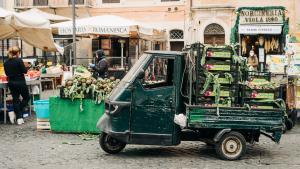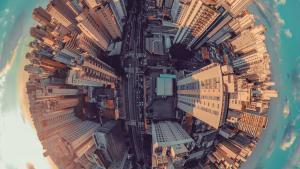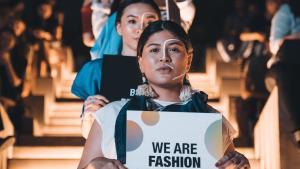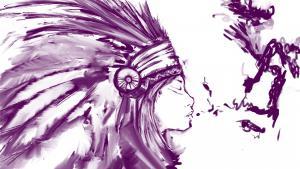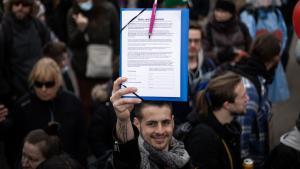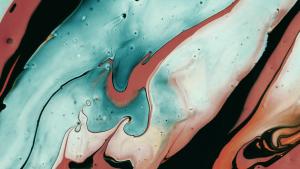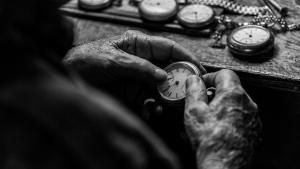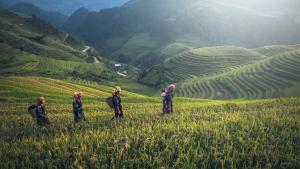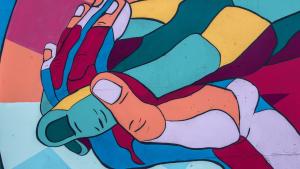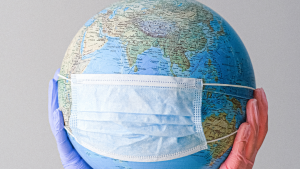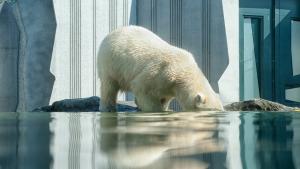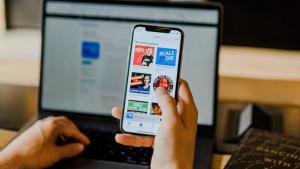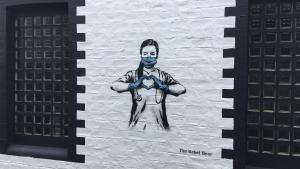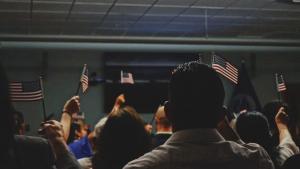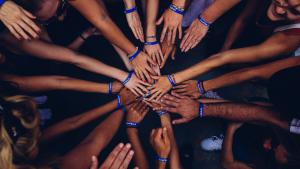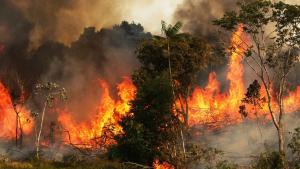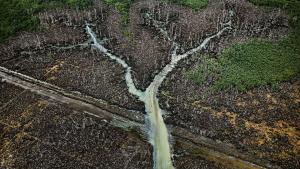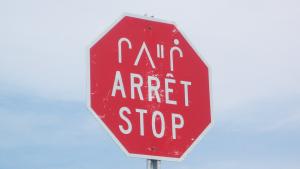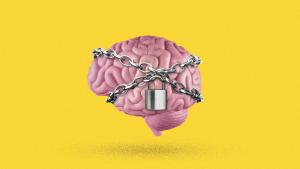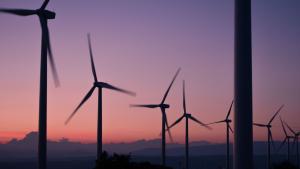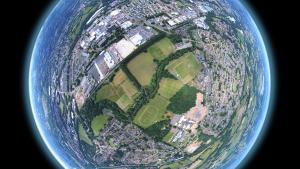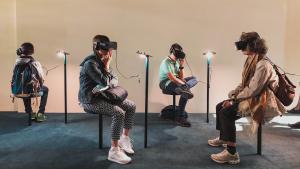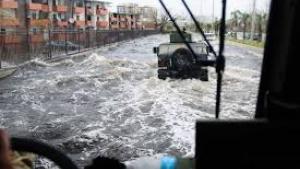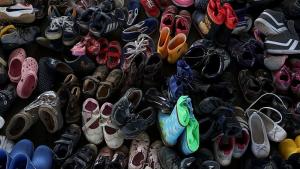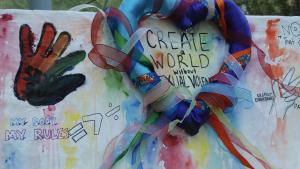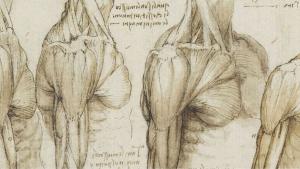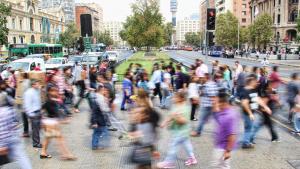Fall 2025
Educating for Democracy

Students will explore how schools can prepare young people to thrive as active participants in a pluralistic democracy.
Growing Biodiverse Culture

Students will explore the health and environmental challenges of globalized food systems while collaborating with agricultural stewards from ASU Farm and international partners.
Humanizing Digital Culture

Students will explore how digital culture shapes human identity, relationships, and our connection to the planet.
Justice Through School Gardens

Engage with on-campus gardens and the roles they play in realizing civic virtues related to ecological awareness, social equity, educational opportunity, and community well-being.
View More Information
Re-envisioning Food Systems

Students will investigate the challenges of creating sustainable local food systems through hands-on experience at a small-scale farm.
View More Information
Spring 2025
Diplomacy Lab: Brazil
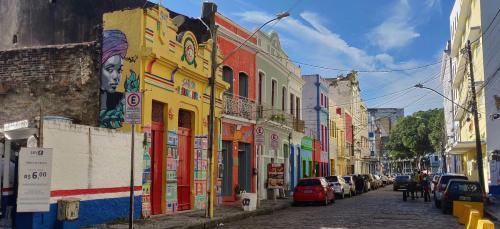
This Humanities Lab focuses on working collaboratively across disciplines to investigate current climate change challenges in Brazil that specifically affect marginalized urban communities (ex. democracy, human rights, health, energy security, economic policy, and conflict).
Printing el Pueblo: A Recovery
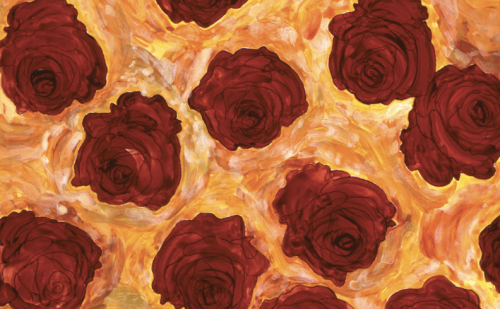
Faculty, museum curator, and students will collaborate to create a collection handbook to accompany an exhibition at the ASU Art Museum of the Hispanic Research Center’s art collection. This exhibition aims to elevate Latinx Printmaking and the ways it has shaped American art.
Humanizing Digital Culture
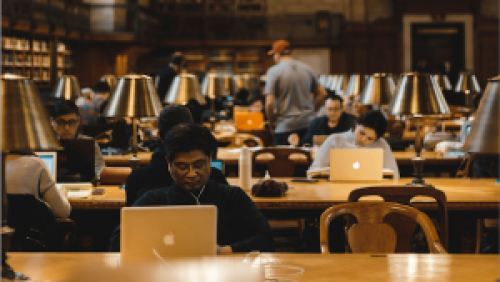
Working together, Lab participants consider how digital culture is (re)shaping human identity and investigate the dual power of humankind's relationship to technology to create empathy while also causing real-world harm.
Intro to Interdisciplinary Research
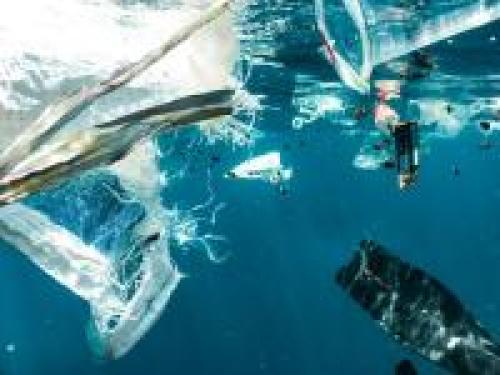
Students in this Lab will learn about interdisciplinary research, develop skills of collaboration, learn helpful research tools, exercise creative problem solving skills, and develop a team inquiry project focused on complex social challenges.
Seeking Truth: Misinformation
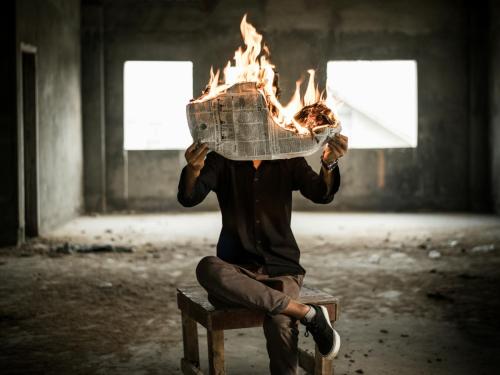
From ancient to modern times, false narratives persist, though today they are amplified by the digital era and its numerous tools (ex. AI) and platforms (ex. TikTok). This surge has profound global to local repercussions, impacting media, politics, science, and economics while eroding trust in institutions, between communities, and affecting individual behaviors.
Fall 2024
Educating for Democracy?
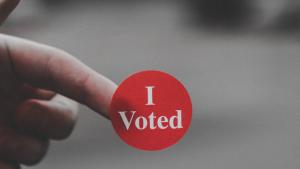
Students will work individually and in groups to research, challenge the status quo, and design transformative projects that reimagine education systems to promote equity, democracy, and justice.
Planetizing Citizenship
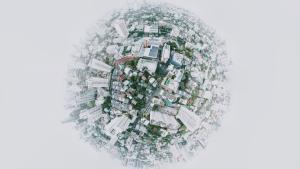
Students will investigate how we may shift our perspectives from citizenship to planetizenship in order to undo existing hierarchies and borders, engaging across gender, age, class, race, ability, species, machines, and matter, in order to collectively remake our planetary futures.
Migration, Art, Place: US/GER
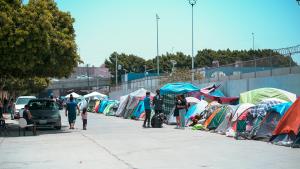
Students will focus on Berlin and Phoenix as places with large and diverse immigrant populations and long histories of migration/emigration to examine major forces that shape human movement and impact the formation of migrant communities and cultural expressions.
Families Living (Un)Documented
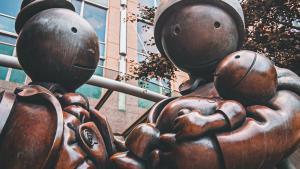
Students will engage with mixed-status families and community organisations to investigate the challenges faced by undocumented youth, using qualitative and quantitative research methods such as storytelling, oral histories, surveys, and digital archives, while producing a podcast as the final project.
US Gun Culture and Gun Impacts
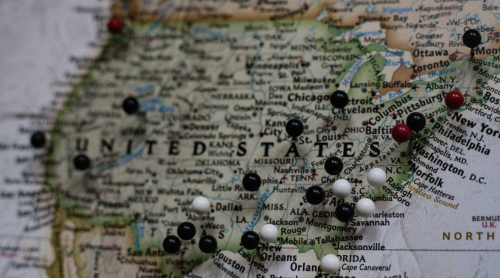
Students will explore the legal, social, and cultural history of firearms in the U.S., examining how firearms technology shaped a "culture" and its connection to gun violence.
Spring 2024
Diplomacy Lab: Brazil
In this Humanities Lab, students will collaboratively investigate the meaning of diplomacy and uncover its relationship to climate, health, societal, and economic issues in Brazil.
Ethics of Language Testing
In this Humanities Lab, students will devote equal attention to examining the role of language testing in promoting literacy and multilingualism and to the question of such testing being unjust and discriminatory.
Guns, Art-making and Truth
In this course, students will dig deeper into the values held by Americans who are most affected by guns along with the embodied experiences of victims of gun violence.
Sustainable Fashion
Through the investigation of case studies, current industry journals, webinars, and discussions with industry experts and workers, students will propose solutions for creating more sustainable fashion supply chains.
Intro to Interdisciplinary Research
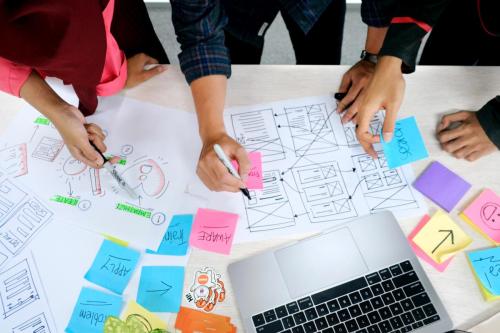
Students in this Lab will learn about interdisciplinary research, develop skills of collaboration, learn helpful research tools, exercise creative problem-solving skills, and develop a team inquiry project focused on complex social challenges.
Fall 2023
Avanzando: Education Pathways
This course, Avanzando - Moving Forward partners with Maryvale to provide educational and career support for Phoenix youth.
Cripping Technology
In this Leonardo Series of Humanities Lab students will reimagine enshrined notions of how a body-mind can move, look, and communicate.
Energy, Justice and Action
In this UNESCO BRIDGES series of Humanities Labs, we will focus on the principles outlined in UNESCO's Guidelines for Sustainability Science in Research and Education.
Humanizing Digital Culture
In this Lab, students explore how digital culture reshapes human identity, balancing technology's power to create empathy and cause harm.
Mediating Ocean Futures
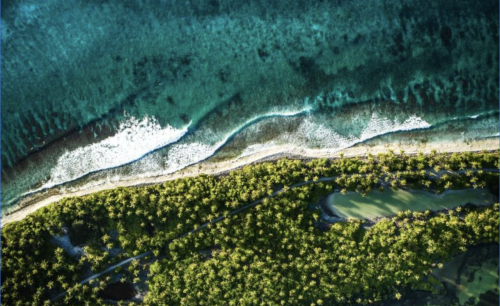
Focusing on climate change, sea-level rise, and pollution, the Mediating Ocean Futures lab examines how diverse communities imagine ocean ecosystems.
Narratives of School Shootings
Students in this Humanities Lab will explore youth interactions with the gun violence narrative, covering victimization, advocacy, and prevention.
Spring 2023
Designing the Future University
This Lab will explore designing the future university in a rapidly changing world. While ASU serves as one prototype, students will consider various approaches.
Diplomacy Lab: Latin America
This Humanities Lab course focuses on a project from the Department of State about how vulnerable urban communities in Brazil adapt and mitigate climate risks.
Gendering Peace & Security
In this UNESCO BRIDGES series of Humanities Labs, students will focus on the principles outlined in UNESCO's Guidelines for Sustainability Science in Research and Education.
Indigenizing Food Systems
Through an interdisciplinary and community engaged approach, this Lab will investigate what it means to indigenize our food systems.
Intro to Interdisciplinary Research
Students in this Lab will learn about interdisciplinary research and develop a team inquiry project focused on complex social challenges.
Making Noise, Making Sound?
Student teams will explore the concept of noise within the realms of sound and music.
Migration, Art, & Place: Berlin/U.S.
This course explores migrant communities at the intersection of place and identity, focusing on art as cultural expression, empowerment, and justice.
Fall 2022
Avanzando Education Pathways
This course, Avanzando - Moving Forward, in partnership with the diverse community of Maryvale, aims to establish clear educational opportunities and career development support for Phoenix youth.
Justice Through School Gardens
This course on school gardens will provide students with interdisciplinary approaches on how to make our food system more sustainable and just by connecting students to local elementary schools.
Humanizing Digital Culture
Lab participants consider how digital culture is (re)shaping human identity, and how humankind attempts to humanize digital culture.
Spring 2022
Indigenizing Food Systems
This Lab will investigate what it means to indigenize our food systems and will grapple with issues and questions regarding food sovereignty and Indigenous health.
Decolonizing 'Madness'
In this Lab, students will explore the impact of social "categories" on our understanding of "mental health."
Narrating Global Development
This Lab investigates the concept and practice of global development as a political, economic, and social practice.
Sustainable Fashion
Through the investigation of case studies and discussions with industry experts, students will propose solutions for creating more sustainable fashion supply chains.
Language Emergency
In this Lab, students will work on language documentation projects and will investigate efforts to raise awareness of the heritage of the Salt River Pima Maricopa Indian Community.
Intro Problem-Based Interdisciplinary Research
Students in this Lab will learn about interdisciplinary research and develop a team inquiry project focused on complex social challenges.
Navigating Chaos
Leonardo Lab Series: The course invites students to bring their own complex scenarios and phenomena to discuss, represent or prototype.
Fall 2021
Aging in American Culture
American culture has become obsessed with an ideology emphasizing the social and cultural exclusion of people as they age. This Lab investigates what it means to age in American culture.
Humanizing Digital Culture
Leonardo Lab Series: Lab participants consider how digital culture is (re)shaping human identity, and how humankind attempts to humanize digital culture.
Food, Health & Climate Change
This Lab will explore how the intersections between the humanities, narratives and economics inform us about the connections between food systems, climate change, and the health of humans and the planet.
Deconstructing Race
This Lab will investigate the category of race in a transnational framework, examining geographical and historical manifestations of race with social, economic, political, and cultural practices.
Epidemic Emergences
In this course we interrogate the histories of epidemics and the stories that help us heal.
Spring 2021
Feeling Climate Uncertainty
FEELING CLIMATE UNCERTAINTY will assess, consider, and address the complex emotions arising from human-driven climate disruption.
Information Overload
This Lab will focus on the present moment of information overload, where the sheer volume of data, much of it false or misleading, poses significant challenges.
ArtScience: COVID Response
ArtScience: COVID Response investigates the critical skillsets and mindsets required to navigate crisis, build resilience, and create the future.
Sustainable Fashion
Through the investigation of case studies and discussions with industry experts and workers, students will propose solutions for creating more sustainable and fashion supply chains.
Facing Immigration
The FACING IMMIGRATION Lab, repeating after a very successful run in Spring 2019, will investigate the social, political and historical questions raised by immigration through art.
Intro Interdisciplinary Research
Intro Interdisciplinary Research offers undergraduates the chance to learn methods and skills for collaborative, cross-disciplinary research, addressing today’s grand social challenges.
Fall 2020
Why is the Amazon Burning?
The complicated human relationship with the Amazon ecosystem will be studied through multiple analytical lenses, including film, literature, sustainability, and international development.
Performing the Anthropocene
In this Lab, students will investigate global issues tied to human consumption and shape their findings into a culminating performance impact piece.
Only English?
Students will develop their own possible solutions based on their inquiries into the policies, practices, and ethical principles related to monolingualism and multilingualism.
Rethinking Addiction
Students in this Lab will focus on defining “addiction,” and investigate the way varied conceptual models of addiction affect societies, and how societies and individuals can and should respond.
Disrupting Dis/Ability
Students will investigate disabling discourses of disability across medical, legal, academic, media and other public institutions then develop ways to expand understandings of disability in our cultural imaginary.
Shaping Climate Narratives
Faculty and students will collaborate to write a performance text based on survivors of extreme weather events in the U.S. and around the world.
Spring 2020
Energy and Social Justice
Students will work closely with faculty and prominent energy leaders to investigate issues and design narratives that will help protect the planet and promote social justice.
Life without Earth
Students will work with faculty and local space activists and companies to examine how life and Earth are interconnected and imagine future possibilities for life absent Earth.
Sound and Well-Being
Students will investigate the meaning, emotion, and movement of sound and silence through exciting site visits, workshops, and collaborative research projects.
Working Bodies & Technology
Students will connect art and science through exploratory, collaborative workshops along with hands-, mouth-, nose-, and feet activities.
Spring 2019
Rebuilding Puerto Rico
The Rebuilding Puerto Rico Humanities Lab will investigate the ethical and political questions, and the technological and strategic ones, entailed in this and other disaster recoveries.
The Future of Cars
As the negative aspects of the car become more apparent, what is the future of the automobile? And, how will the car’s future affect us?
Facing Immigration II
Students and faculty will collaborate to delve into both current and historical aspects of immigration and refugee movements.
Fall 2018
Facing Immigration I
This course will seek ways to respond to difficult, transdisciplinary questions on migration and movement. Together, students and faculty will engage with current and historical immigration and refugee movement.
Re-Envisioning Food Systems
This course will reflect on challenges in the current food system and seek solutions to them. Challenges include nutritional deficits, unjust labor practices, the overuse of natural resources, and threats to the earth’s biodiversity.
Spring 2018
Sexual Violence
This course will take an interdisciplinary arts-and humanities-based perspective to explore these and other questions as we trace the history of sexual violence.
Health Humanities
This course is for you if you are inspired by personal and communal health and well-being, regardless of your major field of study.
Spring & Fall 2017
Health Humanities
This course is for you if you are inspired by personal and communal health and well-being, regardless of your major field of study. This is an interdisciplinary area of study that works at the intersections of the biological and medical sciences and the humanities.
Sustaining Humans
This course explores human sustainability in its broadest sense: What does sustaining our species mean? How should we determine what must be sustained in our world(s)?
